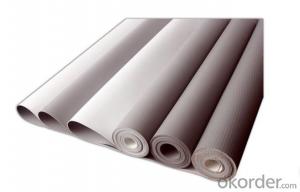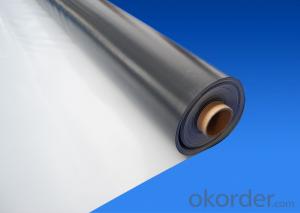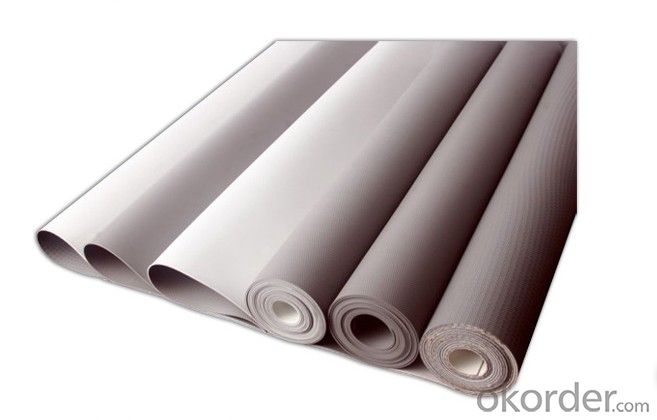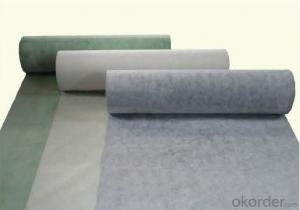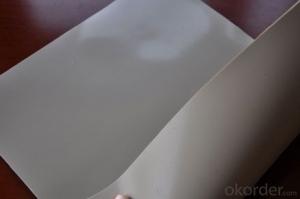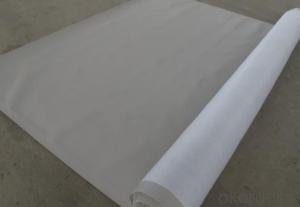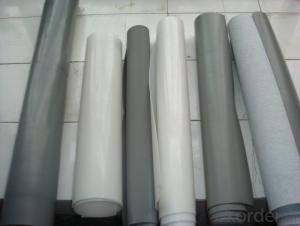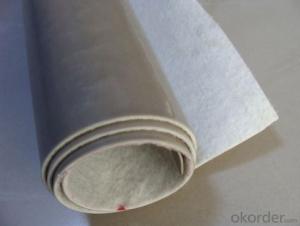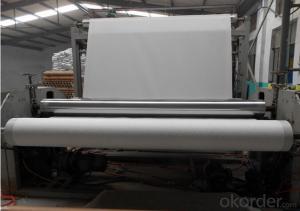Polyvinyl Chloride Waterproofing Membrane
- Loading Port:
- China main port
- Payment Terms:
- TT OR LC
- Min Order Qty:
- 10000 m²
- Supply Capability:
- 300000 m²/month
OKorder Service Pledge
OKorder Financial Service
You Might Also Like
1.Structure of PVC Waterproofing Membrane Description:
c is a kind of excellent high quality, high polymer waterproof sheet, the PVC resin to join plasticizer, anti-uv agent, anti-aging agent, stabilizing agent, such as processing AIDS, by extrusion molding of polymer adhesive waterproofing materials. Product has high tensile strength, elongation, good stability, small shrinkage rate, good low temperature flexibility, good ageing resistance, strong root penetration resistance, long service life, is the key recommended products by the ministry of construction, especially its wide amount to 2.05 meters, waterproof layer to minus the many seams, and polyvinyl chloride (PVC) thermoplastic gives the coil can be hot air welding and vigilant fixed performance, so as to thoroughly solve the has plagued the construction industry caused by poor performance of glue permeation leakage problems.
2.Main Features of PVC Waterproofing Membrane:
Long service life, resistant to ageing.
High tensile strength, high elongation rate.
Good low temperature flexibility.
Good root permeability resistance
Conveniente for construction,Solid and pollution-free.
3.Specification of PVC Waterproofing Membrane:
| Index | ||||
| Tensile Strength (Mpa) ≥ | 10 | |||
| Elongation at break% | 200 | |||
Fracture strength( kN/m)≥ | 40 | |||
Low temperature bending,℃≤ | -20 |
4.PVC Waterproofing Membrane Images:
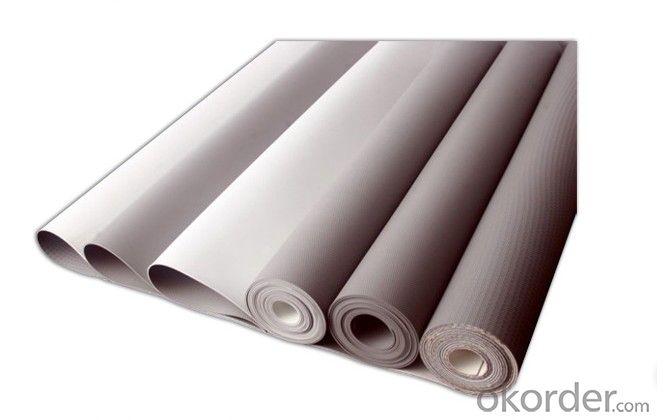
- Q: Can a waterproofing membrane be used for residential buildings or homes?
- Yes, a waterproofing membrane can be used for residential buildings or homes. It is commonly used in basements, bathrooms, and other areas prone to water damage to prevent moisture infiltration and protect the structure from potential water leaks or flooding.
- Q: Can a waterproofing membrane be used in earthquake-prone areas?
- Using a waterproofing membrane in areas prone to earthquakes is not only possible but highly advisable. This is because it serves as an effective shield against water infiltration, which can cause significant harm to buildings and structures during seismic events. The main purpose of waterproofing membranes is to create a barrier that prevents water from seeping in, thereby safeguarding the structural integrity of a building. Moreover, these membranes possess some degree of flexibility and elasticity, allowing them to absorb and distribute the forces exerted during an earthquake. This reduces the likelihood of cracks and leaks occurring. Nonetheless, it is crucial to ensure that the waterproofing membrane chosen is specifically designed and tested to meet the requirements of earthquake-prone areas. Factors such as the intensity and frequency of seismic activity in the region should be taken into account. Seeking advice from a structural engineer or waterproofing specialist is highly recommended to identify the most suitable waterproofing system for earthquake-prone areas.
- Q: Can a waterproofing membrane be used on tunnels with fire protection systems?
- Tunnels equipped with fire protection systems can indeed make use of a waterproofing membrane. It is actually quite common to recommend the use of a waterproofing membrane alongside fire protection systems in tunnels, as it adds an extra layer of safeguarding. The purpose of this membrane is to prevent any water from infiltrating the tunnel, as this could potentially harm the fire protection systems and undermine their effectiveness. By ensuring the tunnel remains watertight, the waterproofing membrane preserves the integrity and functionality of the fire protection systems, enabling them to fulfill their intended purpose in the event of a fire. Moreover, the waterproofing membrane can also serve as a barrier, impeding the spread of fire by blocking the passage of flames and smoke. Nonetheless, it is crucial to ensure that the chosen waterproofing membrane is compatible with the specific fire protection systems employed in the tunnel in order to ensure optimum performance and safety.
- Q: How does a waterproofing membrane handle movement of a building due to settling or seismic activity?
- A waterproofing membrane is designed to handle movement of a building caused by settling or seismic activity by providing flexibility and elasticity. It can accommodate small shifts and vibrations without cracking or breaking, ensuring that the waterproof barrier remains intact. The membrane's ability to stretch and contract helps it to adapt to the movement of the structure, preventing water intrusion and maintaining its effectiveness in safeguarding the building against moisture damage.
- Q: Are there any specific considerations for installing a waterproofing membrane on masonry surfaces?
- Yes, there are several specific considerations for installing a waterproofing membrane on masonry surfaces. Firstly, it is important to ensure that the masonry surface is clean and free from any dirt, debris, or loose materials that could compromise the adhesion of the membrane. Additionally, the surface should be properly prepared by repairing any cracks, holes, or damaged areas before applying the membrane. The type of waterproofing membrane chosen should be compatible with masonry surfaces and be able to withstand the movement and expansion that can occur. Proper installation techniques, such as ensuring sufficient overlap and proper sealing of joints, are also crucial to ensure effective waterproofing. Lastly, regular inspections and maintenance should be conducted to identify any potential issues and address them promptly.
- Q: Can a waterproofing membrane be used for a plaza deck waterproofing?
- Yes, a waterproofing membrane can be used for plaza deck waterproofing. Plaza decks are typically exposed to the elements, including rain and snow, and require a waterproofing system to prevent water infiltration and potential damage to the structure below. Waterproofing membranes are designed specifically for this purpose, offering a barrier against water and protecting the deck from moisture-related issues such as leaks, deterioration, and mold growth. These membranes are typically made from materials such as bitumen, PVC, or EPDM, and are applied in multiple layers to ensure a durable and watertight seal. By using a waterproofing membrane, plaza decks can effectively maintain their structural integrity and longevity.
- Q: Can a waterproofing membrane be used in industrial facilities or warehouses?
- In industrial facilities or warehouses, it is possible to utilize a waterproofing membrane. These types of facilities typically have concrete floors or walls that are prone to water damage caused by leaks or moisture. By applying a waterproofing membrane, it becomes possible to shield these areas from water penetration, thereby preventing any potential harm to the structure and its contents. The purpose of waterproofing membranes is to establish a barrier that effectively prevents water from seeping through the surface, making them a practical solution for industrial facilities and warehouses where moisture control is of utmost importance. Furthermore, these membranes possess durability and can endure heavy foot traffic and equipment, making them ideal for use in areas with high levels of activity. Ultimately, the utilization of a waterproofing membrane in industrial facilities or warehouses plays a crucial role in maintaining a dry and secure environment, ensuring the protection of the structure and its contents.
- Q: Can a waterproofing membrane be used on roofs?
- Roofs can indeed benefit from the usage of a waterproofing membrane. It is quite common to find these membranes on flat or low-slope roofs, as they offer an extra layer of protection against water infiltration. The materials used for these membranes are typically synthetic, including modified bitumen, EPDM, PVC, or TPO. These materials are chosen for their durability, flexibility, and ability to resist UV rays, weathering, and ponding water. When installed correctly, a waterproofing membrane effectively safeguards the underlying roof structure by preventing water from seeping in, thus safeguarding the building from potential leaks and water damage.
- Q: Can a waterproofing membrane be used on stainless steel surfaces?
- Yes, a waterproofing membrane can be used on stainless steel surfaces. The membrane helps to prevent water penetration and protect the stainless steel from corrosion or damage caused by moisture.
- Q: Can a waterproofing membrane be used for a foundation?
- Yes, a waterproofing membrane can be used for a foundation. Waterproofing membranes are designed to provide a barrier against water infiltration and can be used to protect the foundation from moisture damage. These membranes are typically made from materials such as bitumen, rubberized asphalt, or polymer-based sheets that are installed on the exterior side of the foundation walls. They are designed to prevent water from seeping into the foundation, which can help to prevent potential issues such as water damage, mold growth, and structural deterioration. It is important to ensure that the waterproofing membrane is properly installed and meets the specific requirements of the foundation to ensure its effectiveness.
Send your message to us
Polyvinyl Chloride Waterproofing Membrane
- Loading Port:
- China main port
- Payment Terms:
- TT OR LC
- Min Order Qty:
- 10000 m²
- Supply Capability:
- 300000 m²/month
OKorder Service Pledge
OKorder Financial Service
Similar products
Hot products
Hot Searches
Related keywords
